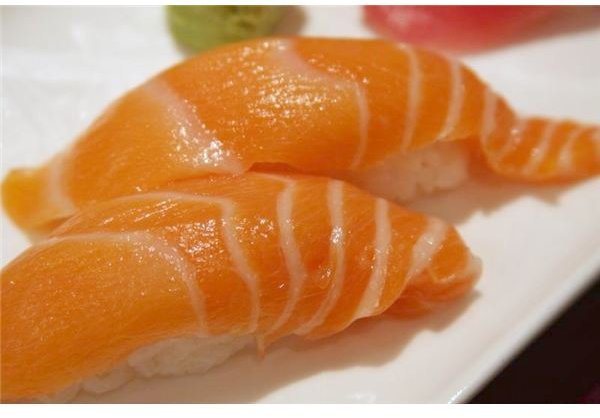Is Sushi Healthy? Learn How Sushi can Improve your Health and Well-being
What is Sushi?
Sushi, in its simplest form, is typically fresh, raw fish on a piece of rice. Many of the non-initiated are turned away by the concept of raw meat, but sushi comes in a variety of forms and has so much more depth than it’s given credit for, and the creativity of each individual chef shows in every piece and roll. Going to a sushi restaurant for the first time may leave you confused initially, but it’s much less overwhelming once you learn some of the basic types of sushi:
Sashimi is sliced, raw fish, usually served by itself or with a bowl of rice.
Nigiri-sushi is a simple, well-formed ball of rice topped with a slice of fish.
Maki-sushi is sushi rolled in seaweed paper.
Health Benefits of Sushi
There’s a saying in Japanese culture that food should have “_something from the sea and something from the mountain_s,” presumably to provide a balance of flavors as well as nutrients. The saying is the basis for sushi, and while some of the ingredients vary depending on the roll as well as the chef, the foundation remains largely the same, with the fish and seaweed coming from the sea, and the rice, soy, and other ingredients coming from the land (or “the mountains”). So what exactly do these ingredients provide that are so beneficial?
One major advantage of eating sushi is its abundant supply of omega-3 fatty acids. The seaweed and fish contain large quantities of the superunsaturated omega-3 fats, especially DHA (docosahexaenoic acid). Omega-3 is an “essential fat,” meaning our bodies are unable to produce or synthesize it, but it is needed for normal function. Fish is by far the best source of DHA, and while flax seed is more popular, it’s a poor source because the human body has to inefficiently transform the alpha-linolenic acid found in flax into DHA.
While studies of the importance of DHA are relatively new, its many benefits are well documented: DHA activates numerous genes, lowers risk of death after heart attack, regulates the body’s immune system, has been shown to improve cognitive abilities in children, and is a big factor in nervous system and brain development.
Sushi also contains an abundance of EPA (eicosapentaenoic acid), which, along with DHA, helps to prevent cardiovascular disease and cancer, and regulates cholesterol count in the blood stream
The seaweed used in sushi is also full of nutrients. Vitamins A, B, C, D, E as well as minerals such as iodine are all present in significant amounts: seaweed contains ten times the mineral content of plants that grow on land. It is also one of the main sources of food for fish and shellfish, which is a big reason why fish are so healthy.
Other things commonly eaten with sushi also have health benefits:
Wasabi - Has high vitamin C content. Also has anti-bacterial properties.
Sesame seeds - Has high content of mono-unsaturated oleic acids and linoleic acid. Also contains antioxidants.
Rice - While it isn’t the most nutrient-rich food, rice is very low in saturated fat, cholesterol, and sodium.
Sushi Quality
As with anything else, the quality of the sushi makes a difference in its nutritional value. It’s especially important that the fish is high-quality, sushi-grade fish. Make sure it’s fresh and doesn’t have the “fishy” smell, which occurs due to the natural breakdown of the fish. The sooner it’s eaten, the fresher it will be, but of course not many restaurants are situated right next to the sea, and in most cases, the fish are frozen as soon as they’re caught in order to preserve it.
Seaweed also comes in varying qualities–darker green and firm is better.
Does Eating Sushi Lead to a Longer Life?
The Japanese make up only about 2.5% of the world’s population, yet they consume 20% of the global fish catch, half of it eaten raw, thus the typical Japanese adult acquires much larger proportions of their proteins and fats from fish than the average Westerner. It’s interesting to note that, according to findings by the World Bank, the average life expectancy of Japan is 82.6 years, whereas that of Americans is at 78.4 years.
So, is sushi healthy? There are many other factors that need to be considered, and while it would be unfair to say that the longer life expectancy of Japanese people can be attributed solely to the greater amounts of sushi consumed, it’s impossible to deny that sushi is an incredible source of several essential vitamins and nutrients.
References
Mouritsen, Ole G. Sushi: food for the eye, the body & the soul. New York: Springer Science+Business Media Inc.; 2009.
Nolen, Jorie. What is Sushi? EatSushi.com. Available at: https://www.eatsushi.com/whatsushi.asp Accessed October 14, 2010.
Types of Sushi. The Nibble. 2007. Available at: https://www.thenibble.com/reviews/main/fish/seafood/sushi-glossary.asp Accessed October 14, 2010.
Photo Credit
Image courtesy of https://commons.wikimedia.org/wiki/File:Salmon_Nigiri_Sushi,_2008.jpg
